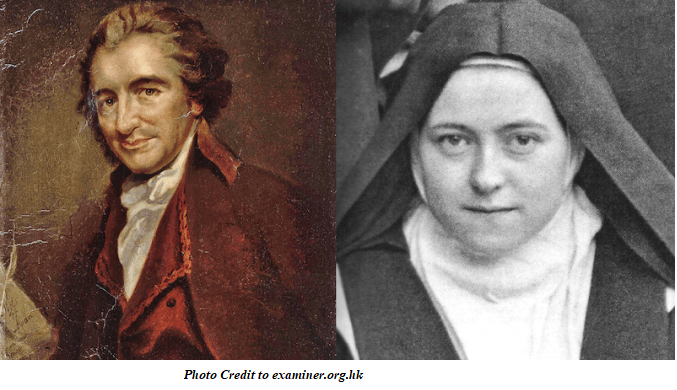WORLD: Some thoughts on spirituality
BY Basil Fernando
 In his writings, including the book, Common Sense, Thomas Paine celebrated the triumph of reason. He saw the modern age as a product of reason and that all knowledge and all approaches to life should be based on reason alone. This was a characteristic of his age, the age that began with the enlightenment and that saw its flowering in the 18th and 19th centuries.
In his writings, including the book, Common Sense, Thomas Paine celebrated the triumph of reason. He saw the modern age as a product of reason and that all knowledge and all approaches to life should be based on reason alone. This was a characteristic of his age, the age that began with the enlightenment and that saw its flowering in the 18th and 19th centuries.
Writing near the end of the 19th century, Friedrich Nietzsche spoke of the death of God. His position was that by the triumph of reason “we” had killed God and all the water in the world was not enough to wash our hands of the blood. The idea that reason had triumphed over any rational person’s belief in the supernatural was his theme, and that this way of thinking replaced the absolute standards for morality.
Fyodor Dostoyevsky, on the other hand, saw the new generations of people that have emerged as a product of a new cult of reason as forebears of a kind of violence that the world had never seen. His book, Crime and Punishment, is centered around one character, a new age young man who was educated but poor, and how he thought of himself as having achieved a triumph by violating the most basic principle of morality, which is the prohibition against killing. In this other works, Dostoyevsky followed this same theme, showing that what was considered a triumph of reason had resulted in (and would continue to result in) the worst forms of violence and brutality.
A young girl who died at the age of 24 in complete obscurity after having lived several years in a Carmelite convent wrote an autobiography under the instructions of her Mother Superior, who happened to be her elder sister, and she approached this whole issue from a completely different perspective. This was St. Thérèse de Lisieux. She saw the essence of God as love and that it was love that is a far deeper, more primordial, quality of human beings than anything else, including reason.
There is a greater recognition in the sciences themselves that the rational mind is only part of the human mind and not the whole of it. The developments in the field of psychology have led to a wide discussion of the role of the unconscious aspect of human capacity. The unconscious does not behave according to the postulates of reason. The way the unconscious works is still a mystery, though some aspects have been revealed through conversations between psychiatrists and their patients. It has been discovered that many things that they revealed do not fall within the realm of reason and it is necessary to look into other factors and to explore them in order to get some glimpse of what happens.
Carl Jung, in his book, Modern Man in Search of a Soul, deals with these discoveries that he was forced to reckon with in dealing with patients. Studying dreams, for example, was one aspect of trying to understand various developments within individual minds. This area is ever-expanding and the field of psychology, as Jung mentioned, is still a young science.
In the field of theoretical science itself, one of the points of serious debate is as to whether consciousness is a product of the brain. That was what was believed in the past. Thoughts, it was believed, were produced by the brain. However, this is being seriously debated by those who postulate that consciousness exists independently of the human brain and that the brain merely filters this independently-existing consciousness. Thus, the claim that reason is the ultimate achievement of human beings, as it was thought during the time of Thomas Paine, is today not taken as the soul function of the human mind.
Today’s debate is on the issue of consciousness, its meaning and whether it is a product of the physical brain and what constitutes the brain or whether consciousness exists independently of these physical factors. Associated with the misunderstanding of consciousness is, among other things, the issue of the link between consciousness and love. Is love purely a physical function of the body and of the brain, or is it something independent, existing in the realm of consciousness? This is an unavoidable question once it is accepted the human consciousness may not be a function dependent on the brain, but existing independently of it.
It is within that context that the young saint, in her autobiography named, The Story of a Soul, explores the magnitude of the implications of love as the most primordial aspect of human existence. She does not put this in any scientific language; she speaks of her experience in a very simple manner. However, the implications of her thought is of profound importance.
……………..
The views shared in this article do not necessarily reflect that of the AHRC.



